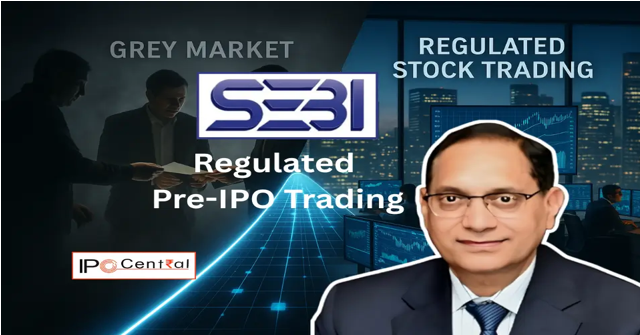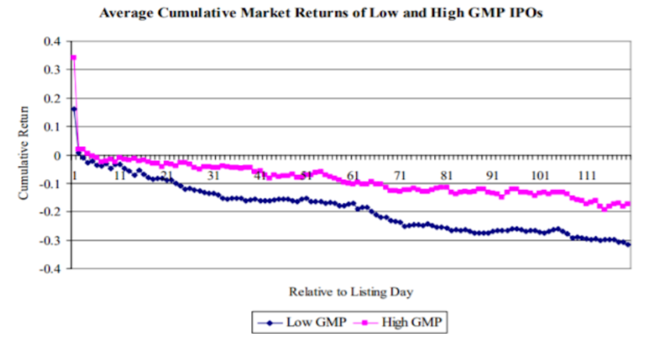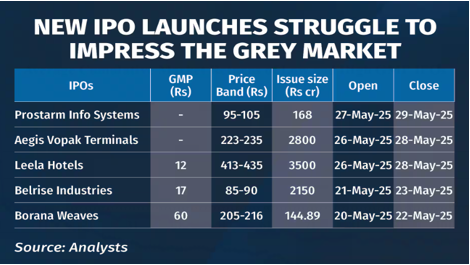From Grey to Clear: SEBI’s Push for Regulated Pre-IPO Markets
- IBS Times

- Sep 13, 2025
- 4 min read
Ria Siby
In recent years, India’s primary market has witnessed an extraordinary boom in Initial Public Offerings (IPOs). Start-ups, new-age technology companies, and traditional enterprises have increasingly tapped the public markets to raise capital. Alongside this surge, a parallel ecosystem has grown the unregulated grey market for unlisted securities. In this informal space, investors buy and sell pre-IPO shares without oversight, often driven by speculation rather than fundamentals.
While the grey market has historically shaped retail investor sentiment through the so-called Grey Market Premium (GMP), it lacks transparency and regulatory supervision. Recognizing the risks and inefficiencies, the Securities and Exchange Board of India (SEBI) has proposed a regulated pre-IPO trading platform. This reform aims to improve price discovery, protect investors, and ensure fair taxation, thereby strengthening the overall integrity of India’s capital markets.

Understanding the Grey Market
The grey market in securities refers to trading in company shares before they are formally listed on recognized stock exchanges. These trades often involve employees with Employee Stock Ownership Plans (ESOPs) or early-stage investors. Intermediaries are also willing to sell shares to prospective investors who want to secure an allocation before the IPO.


Since the transactions occur outside formal channels, they are opaque and lack standard documentation. The Grey Market Premium essentially the difference between the IPO issue price and the price investors are willing to pay informally becomes a key indicator of sentiment. However, GMP is rarely a reliable reflection of genuine demand or company fundamentals. Instead, it can be influenced by market rumors, hype, and manipulative practices. As a result, retail investors who rely on GMP signals are exposed to undue risk.
Why Regulation is Needed

The unregulated grey market presents multiple challenges for India’s capital market ecosystem.
Firstly, poor price discovery is a persistent concern. Since there is no transparent order book, pricing is shaped by speculation rather than supply and demand dynamics. Inflated or manipulated bids can distort investor perception of an IPO’s attractiveness.
Secondly, retail investors are vulnerable in this environment. Without clear rules or oversight, disputes often go unresolved, and defaults may go unpunished. Many small investors are lured into the grey market by promises of quick gains, only to face significant losses when listing prices diverge from GMP expectations.
Thirdly, tax leakage is a major drawback. Informal trades frequently escape documentation and, by extension, taxation. This not only deprives the exchequer of revenue but also undermines market discipline.
Finally, although laws such as the Securities Contracts (Regulation) Act, 1956, technically extend to trading in unlisted securities, enforcement has been inconsistent. This regulatory vacuum has allowed the grey market to flourish unchecked.
SEBI’s Proposal for a Regulated Pre-IPO Platform

In response, SEBI has proposed the establishment of a regulated venue for pre-IPO trading. The vision is to create an official marketplace where unlisted shares can be traded transparently under SEBI’s supervision.
This proposed platform would enforce mandatory disclosures from issuers and intermediaries, ensuring that investors have access to accurate information on company fundamentals and associated risks. It would also formalize the trading window during the period between allotment and listing, replacing today’s informal mechanisms.
Investor protection is central to the proposal. Standardized contracts, supervised transactions, and dispute resolution mechanisms would bring much-needed confidence. At the same time, by
shifting trading into formal channels, SEBI aims to ensure tax compliance, thereby curbing revenue leakages.
Implications for the Capital Market

A regulated pre-IPO platform could significantly reshape India’s financial ecosystem. Transparent price discovery would help align IPO valuations with genuine market appetite. For retail investors, it would reduce reliance on speculative GMP indicators and mitigate the risks of misinformation.
For employees and early-stage investors, particularly those holding ESOPs, a formal exit mechanism would provide liquidity in a transparent and compliant manner. For companies, insights derived from pre-listing trades would offer valuable signals to fine-tune issue pricing.
Systemically, the regulation would curb manipulative practices, thereby enhancing the credibility of Indian markets. Moreover, the government would benefit from increased tax revenues as transactions are documented and monitored. Together, these measures could strengthen investor trust and promote long-term stability in the capital markets.
Enhancing the Proposal
While SEBI’s initiative is welcome, its success will depend on thoughtful implementation. A phased rollout, beginning with large and prominent IPOs, could help refine processes before wider adoption.
Auction mechanisms could be incorporated to improve price efficiency, especially in relatively illiquid markets. Regular reporting of trading volumes, bid-ask spreads, and investor participation would enhance transparency further.
Investor education will also be crucial. Given the grey market’s influence over the years, SEBI should run awareness campaigns highlighting the differences between speculative GMP and regulated pre-IPO pricing. Additionally, engaging self-regulatory organizations and registered intermediaries could strengthen compliance and operational efficiency.
A Global Context
Globally, several developed markets provide regulated avenues for trading unlisted shares. These include private placement exchanges and structured auction platforms, which ensure that pre-IPO trades are transparent, tax-compliant, and investor-friendly. India’s proposal thus aligns with international best practices, signaling its evolution towards a more mature and globally competitive financial market.
Conclusion
SEBI’s proposal to regulate the grey market marks a bold and timely reform in India’s capital market journey. By transitioning pre-IPO trading from an opaque and speculative arena into a transparent, supervised system, SEBI seeks to improve price discovery, enhance investor safety, and strengthen tax compliance.
If executed carefully with phased implementation, investor awareness, and robust oversight, the regulated pre-IPO platform could transform market practices and boost investor confidence. For a country witnessing an unprecedented IPO boom, such a reform represents not only a safeguard but also a strategic leap towards a stronger, fairer, and more globally competitive financial ecosystem.








Comments